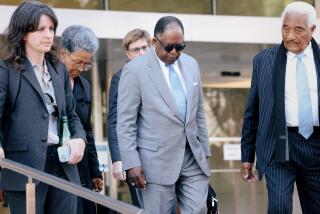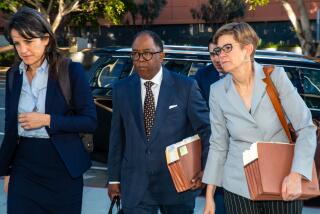Each Side Argues for ‘Common Sense’ in Verdict on Mayor
- Share via
Deputy Dist. Atty. Charles Wickersham said Wednesday that “common sense” suggests that Roger Hedgecock participated in a conspiracy to win the 1983 mayoral election, and that the mayor’s denials of having done so are “like . . . trying to ignore reality.”
However, as closing arguments in Hedgecock’s felony retrial began, defense attorney Oscar Goodman told the jurors, who are expected to begin their deliberations today, that if they do apply their common sense to the case, they “will see that it all fits together innocently.”
Calling Wickersham’s contention that the mayor conspired with former principals of the now-bankrupt La Jolla investment firm of J. David & Co. to violate campaign laws “a game of speculation and conjecture,” Goodman caustically added that “the backbone” of the prosecution case is a witness whom the defense attorney described as “a liar (and) . . . a sleazebag.”
Goodman’s acerbic comment--which drew snickers from courtroom observers--was directed at Sorrento Valley investment counselor Harvey Schuster, arguably the major prosecution witness in the case. Schuster’s testimony provided the only direct evidence in the nine-week trial linking Hedgecock to the alleged conspiracy to violate local campaign and financial disclosure laws.
“I submit that when somebody like Harvey Schuster is utilized as the backbone to the prosecution case, then the prosecution is not entitled to having a verdict returned in its favor,” said Goodman, who argued that Schuster lied in his testimony because of his anger over not receiving a lucrative 1982 county contract awarded when Hedgecock was a county supervisor.
After Wickersham delivers a rebuttal statement to Goodman’s closing argument today, Superior Court Judge William L. Todd Jr. will read nearly 100 instructions dealing with legal points and evidence in the case to the eight-woman, four-man jury. By mid-afternoon, the jury, which on Wednesday was sequestered in preparation for deliberations, is expected to begin contemplating its verdict on the 15 felony charges and one misdemeanor count facing Hedgecock.
During his two-hour, 17-minute closing statement Wednesday, Wickersham led the jurors through a maze of transactions that he argued demonstrate that Hedgecock “received . . . and systematically covered up” alleged illegal financial aid from former J. David principals Nancy Hoover and J. David (Jerry) Dominelli to achieve his political and personal goals.
Prosecutors allege that illegal donations from the two former J. David executives were funneled to Hedgecock’s 1983 mayoral campaign through a political consulting firm owned by Tom Shepard, a close friend of the mayor. Hedgecock, however, has described the more than $360,000 that Hoover and Dominelli pumped into Tom Shepard & Associates as a routine business investment designed primarily to help Shepard start his own business, not to get Hedgecock elected mayor.
Wickersham peppered his remarks with phrases such as “absolute nonsense,” “cover up,” “ridiculous . . . explanations,” “deception” and “secrecy” to describe Hedgecock’s actions and alleged subsequent attempts to conceal his dealings with Hoover, Dominelli and Shepard. The three will be tried separately later as alleged co-conspirators.
Wickersham pointed out that Hedgecock began contemplating a mayoral campaign shortly after he was reelected to a second supervisorial term in June, 1980--nearly three years before he won a special May, 1983, race that was scheduled after former Mayor Pete Wilson’s election to the U.S. Senate.
Arguing that Hedgecock wanted “to be the first one out of the box,” Wickersham said that Shepard’s firm was formed in January, 1982, essentially to be a political laundry for illegal contributions to Hedgecock’s future mayoral campaign.
Although Hedgecock has denied knowing that Dominelli invested in Shepard’s firm, Wickersham directed the jurors’ attention to a blown-up photograph of a $3,000 check that Hedgecock received from the J. David founder in December, 1981--evidence that the prosecutor argued showed that Hedgecock “was aware . . . right from the beginning” that Dominelli was helping to bankroll Tom Shepard & Associates.
Goodman, however, explained that the check was a payment from Shepard to Hedgecock for use of a computerized mailing list. Although the check had J. David’s letterhead on it, the defense attorney said that Shepard had told Hedgecock that he (Shepard) would be temporarily using J. David’s checking accounts until he set up his own business accounts.
In addition, Goodman, who has represented some of the most notorious alleged organized crime figures in the nation, prompted laughter in the courtroom when he argued that “if there’s a conspiracy, you can bet” that Dominelli would not have handled the transaction via a J. David check made out to Hedgecock.
“If there’s a conspiracy, at least with a lot of the clients I usually represent, it would be cash,” Goodman said.
Wickersham characterized the $3,000 check as being one of many crucial transactions in which Hedgecock’s denial of wrongdoing hinges on his explanation that “he didn’t know” the sources of money that benefited him.
“This intelligent, articulate man is going to have to come back to the final frontier--I didn’t know,” Wickersham said. “The issue in this case is the defendant’s state of mind. I think we’ve knocked down all the other walls, opened all the other gates and we’re at the last frontier. Did he know? If you apply common sense . . . the answer is yes, he did know.”
Hedgecock “had to know” that he was receiving illegal donations from Shepard’s firm, Wickersham said, noting that the firm paid a $2,000 bill for video coaching lessons for Hedgecock even before it received an August, 1982, contract to run his mayoral race. While Hedgecock’s committee paid Tom Shepard & Associates about $30,000 throughout the race, that fee “didn’t come close” to covering the firm’s campaign-related costs for staff, overhead and other expenses, Wickersham added.
Similarly, Wickersham scoffed at Hedgecock’s explanation that he was unaware that Schuster had paid a $500 legal bill for him in connection with a November, 1981, visit to a Century City lawyer who tried to help Hedgecock unravel financial problems stemming from the failure of a real estate partnership. The mayor has said that, because he did not personally receive a bill from the lawyer, he was unaware that there had been a charge.
“Who did he think . . . paid for that lawyer? The Phantom?” Wickersham asked incredulously, noting that Hedgecock and Schuster spent 1 1/2 hours with the attorney, Ronald Blanc.
While driving back to San Diego from the meeting with Blanc, Schuster testified, Hedgecock told him that Dominelli planned to invest in Tom Shepard & Associates so that the political consulting firm would be able to run Hedgecock’s mayoral race. In a case built on circumstantial evidence, that testimony is the only direct evidence tying Hedgecock to the alleged plot to use Shepard’s firm to circumvent the city’s $250-per-person campaign contribution limit.
Goodman, however, characterized that assertion by Schuster as being one of several damaging allegations “dreamt up” by the investment counselor in his attempt to “finally get back” at Hedgecock for not awarding him the 1982 contract to develop the county’s bayfront parking lots.
Throughout his one-hour, 44-minute closing statement, Goodman hammered away at inconsistencies between Schuster’s testimony and that of other witnesses, as well as contradictions between Schuster’s statements in the courtroom and his earlier remarks to prosecutors. For example, the defense attorney punctuated his reading of one letter written by Schuster by repeatedly saying, “A lie!” after each alleged inaccuracy, and then concluded his narration with this description of how, in Goodman’s words, Schuster signed the note: “Sincerely yours, Harvey Schuster, the liar.”
“He (Schuster) is inherently incredible,” Goodman said. “He is a person who I think is amoral, who doesn’t know the difference between a lie and the truth.” Some of the most serious allegations directed against Hedgecock, Goodman added, are simply “the figment of Harvey Schuster’s devious mentality.”
Another key issue in the trial concerns a controversial $130,000 oral-agreement loan that Hedgecock received from Hoover to renovate his South Mission Hills home. Describing the $130,000 loan as “a figure of convenience” arrived at because that was as much as Hedgecock could afford to pay in the wake of J. David’s collapse, Wickersham argued that the project cost much more and that the mayor received additional unreported money from Dominelli and the J. David company.
“It’s like the ugly sister trying to get her foot in the glass slipper,” Wickersham said of the $130,000 figure, pointing out that it excluded expenses for painting, tile and curtains. “They squeezed and they stretched . . . but they couldn’t get it in there.”
Goodman, though, argued that $130,000 was the amount that Hedgecock borrowed and later repaid to Hoover.
Unlike Hedgecock’s first trial, which ended in February in a mistrial with the jury deadlocked 11-1 in favor of conviction, Goodman made no mention in his closing remarks of what the mayor himself has often described as a political vendetta that he claims is being waged against him by Dist. Atty. Edwin Miller and Copley Press, publisher of the San Diego Union and Tribune. Hedgecock’s attorney in the first case, Michael Pancer, argued that the fact that Hedgecock and Miller have long been political enemies contributed to the mayor being “singled out” for prosecution for the kind of mistakes often made on public officials’ financial disclosure statements.
Rather, Goodman reminded the jurors of a key question that he emphasized heavily during the jury selection period--namely, the legal definition of “reasonable doubt.” Hedgecock cannot be found guilty, Goodman told the jurors, unless they unanimously conclude “to . . . a moral certainty” that the mayor did intentionally violate election laws and falsify public disclosure statements to conceal the alleged transgressions.
However, Hedgecock’s personal and political financial history “looks bad (only) when you look at things out of context,” Goodman said.
“It is our position that as to every piece of evidence in this case, our cross-examination of their witnesses established a reasonable inference which can be drawn pointing to innocence, pointing to an innocent act on the part of the mayor,” Goodman said.
More to Read
Sign up for Essential California
The most important California stories and recommendations in your inbox every morning.
You may occasionally receive promotional content from the Los Angeles Times.













